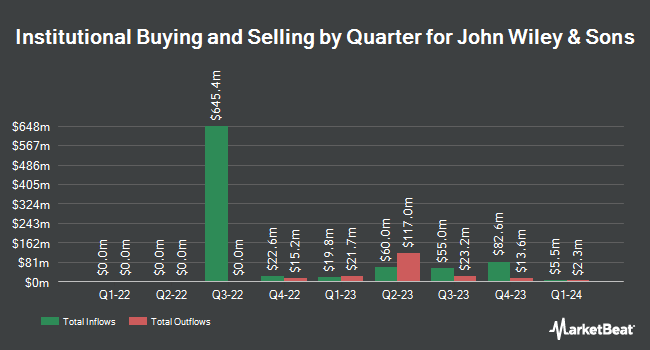Amundi boosted its position in shares of John Wiley & Sons, Inc. (NYSE:WLY - Free Report) by 191.0% in the 4th quarter, according to the company in its most recent 13F filing with the Securities and Exchange Commission. The institutional investor owned 21,121 shares of the company's stock after buying an additional 13,863 shares during the period. Amundi's holdings in John Wiley & Sons were worth $904,000 at the end of the most recent quarter.
Several other large investors also recently bought and sold shares of the company. State Street Corp grew its position in shares of John Wiley & Sons by 7.2% in the third quarter. State Street Corp now owns 1,688,156 shares of the company's stock valued at $81,454,000 after purchasing an additional 113,631 shares in the last quarter. Raymond James Financial Inc. purchased a new stake in shares of John Wiley & Sons in the fourth quarter valued at approximately $34,916,000. Charles Schwab Investment Management Inc. grew its position in shares of John Wiley & Sons by 1.0% in the fourth quarter. Charles Schwab Investment Management Inc. now owns 691,828 shares of the company's stock valued at $30,240,000 after purchasing an additional 6,776 shares in the last quarter. JPMorgan Chase & Co. grew its position in shares of John Wiley & Sons by 29.3% in the third quarter. JPMorgan Chase & Co. now owns 640,940 shares of the company's stock valued at $30,925,000 after purchasing an additional 145,270 shares in the last quarter. Finally, Eagle Asset Management Inc. grew its position in shares of John Wiley & Sons by 40.1% in the third quarter. Eagle Asset Management Inc. now owns 407,997 shares of the company's stock valued at $21,273,000 after purchasing an additional 116,772 shares in the last quarter. 73.94% of the stock is currently owned by hedge funds and other institutional investors.
John Wiley & Sons Trading Down 0.2 %
WLY traded down $0.10 during trading hours on Friday, reaching $44.41. The company's stock had a trading volume of 1,572,673 shares, compared to its average volume of 329,750. John Wiley & Sons, Inc. has a fifty-two week low of $34.85 and a fifty-two week high of $53.96. The stock has a market cap of $2.39 billion, a PE ratio of -48.80 and a beta of 0.82. The business's 50-day moving average is $41.93 and its 200-day moving average is $45.80. The company has a debt-to-equity ratio of 1.26, a current ratio of 0.66 and a quick ratio of 0.61.
John Wiley & Sons (NYSE:WLY - Get Free Report) last released its quarterly earnings data on Thursday, March 6th. The company reported $0.84 EPS for the quarter, beating analysts' consensus estimates of $0.45 by $0.39. John Wiley & Sons had a positive return on equity of 24.14% and a negative net margin of 2.82%. The firm had revenue of $404.63 million for the quarter, compared to analysts' expectations of $401.10 million. As a group, equities research analysts predict that John Wiley & Sons, Inc. will post 3.42 earnings per share for the current fiscal year.
John Wiley & Sons Profile
(
Free Report)
John Wiley & Sons, Inc engages in the provision of research and learning materials. It operates through the following segments: Research, Learning, and Held for Sale or Sold. The Research segment consists of research publishing and research solutions. The Learning segment includes academic and professional reporting lines and consists of publishing and related knowledge solutions.
Further Reading

Before you consider John Wiley & Sons, you'll want to hear this.
MarketBeat keeps track of Wall Street's top-rated and best performing research analysts and the stocks they recommend to their clients on a daily basis. MarketBeat has identified the five stocks that top analysts are quietly whispering to their clients to buy now before the broader market catches on... and John Wiley & Sons wasn't on the list.
While John Wiley & Sons currently has a Hold rating among analysts, top-rated analysts believe these five stocks are better buys.
View The Five Stocks Here
Almost everyone loves strong dividend-paying stocks, but high yields can signal danger. Discover 20 high-yield dividend stocks paying an unsustainably large percentage of their earnings. Enter your email to get this report and avoid a high-yield dividend trap.
Get This Free Report
Like this article? Share it with a colleague.
Link copied to clipboard.